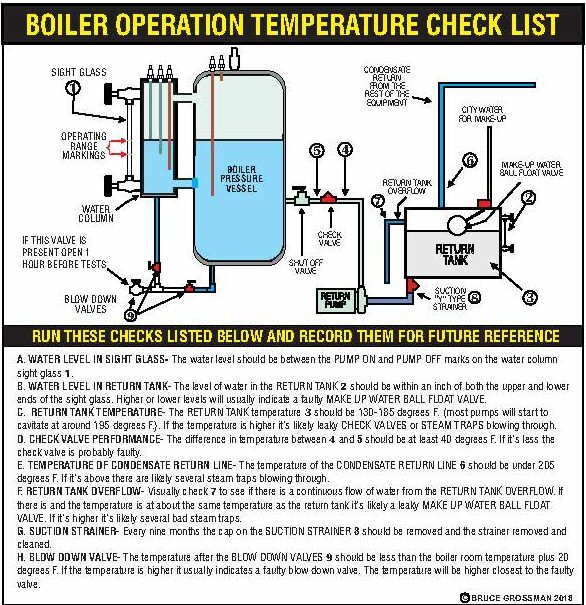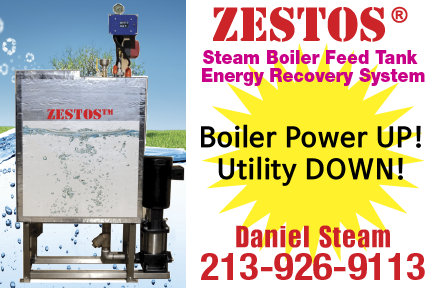What is surging or foaming? – This is when impurities or internal damage to the boiler cause rapid level changes and/or violent bursts of boiling within the boiler pressure vessel. The presence of this condition is usually identified by the rapid change of level in the water column sight glass. Normally, the level indicated in the sight glass should change gradually with the consumption of steam, lowering the level and reaction of the condensate pump pushing water into the boiler, raising the level. When the boiler is operating properly, it is a good idea to take a marking pen and draw lines on the sight glass, marking the levels at which the return pump switches on and off.
The most apparent indication of surging (let’s call both surging and foaming surging from now on) is frequent, rapidly occurring low-water signals, also known as that loud and annoying low-water warning buzzer. This is caused when the surge carries enough water towards the top of the boiler to either drop the water level below the low water sensing electrodes of the water level control or vapor lock in the water column, which will have the same result on the water level sensing electrodes.
The results of surging are carryover of scale and other detritus and particulate debris from inside the pressure vessel of the boiler and into the steam header. Some of this will eventually work its way through the steam piping into the machinery and steam traps, causing some difficulty in analyzing intermittent problems. Also, most boiler treatment chemicals are formulated for use inside the pressure vessel, not for distribution throughout the steam and return systems. Some of this chemistry is corrosive. Frequent exposure to these chemicals over a period of time can damage piping and machinery.
WHAT CAUSES SURGING? – In my experience, there are three common causes for surging:
- Overtreatment with boiler chemistry- The addition of the correct amount of boiler compound is vital to proper boiler operations. However, excessive addition of this type of chemistry can often result in surging.
- High alkalinity- Common water alkalinities consist of bicarbonate, carbonate, hydroxide, phosphate, and silicate compounds. Also, these alkalinities, especially bicarbonates and carbonates, break down to form carbon dioxide gas in the steam. This carbon dioxide is a significant factor in the corrosion of condensate lines. Alkalinity can easily be tested and is typically controlled by softening the makeup water (using a water softener).
- Oil and/or other impurities in the steam and return systems – After a new boiler installation or extensive other steam fitting, it will often result in cutting oil remaining in the pipework, which will migrate to the boiler. After installing new machinery or pipefitting, it is always a good idea to leave the condensate return line open at the outlet of the machine and use the steam inlet cut-off valve to throttle a steam flow through the machine to blow out any debris and/or oil before it enters the return system. If oil contaminates the boiler, it must be treated with tri-sodium phosphate to remove the contamination. This is a somewhat involved process, so contact your boiler manufacturer for specific details if required.
That’s it for this issue. This month’s topic doesn’t lend itself to a diagram or illustration, so I’ve included an illustration showing the steps and procedures to check boiler operations.
NOW, A WORD FROM OUR SPONSOR… That leaking ball float valve is so common, undetected, and destructive that I designed an electronic level control that replaces this relic of the 18th century, which is called the EZ-Level controller. Look for our ad for this fine product in this month’s issue.


Bruce Grossman
Bruce Grossman is the Chief of R&D for EZtimers Manufacturing. EZtimers is the manufacturer of the new EZ DOSE boiler compound manager and return tank level control which replaces that troublesome ball float valve in the condensate return tank and automatically adds the correct amount of boiler compound to the return tank preventing the oxygen corrosion and scaling. Our SAHARA and DIB-M high purity separator water mister/evaporators provide a thrifty, legal method to get rid of the separator water generated by your dry-cleaning machine. See our Ad in this issue and for further information on EZtimers products visit www.eztimers.com Please address any questions or comments for Bruce to bruce@eztimers.com or call 702-376-6693.

